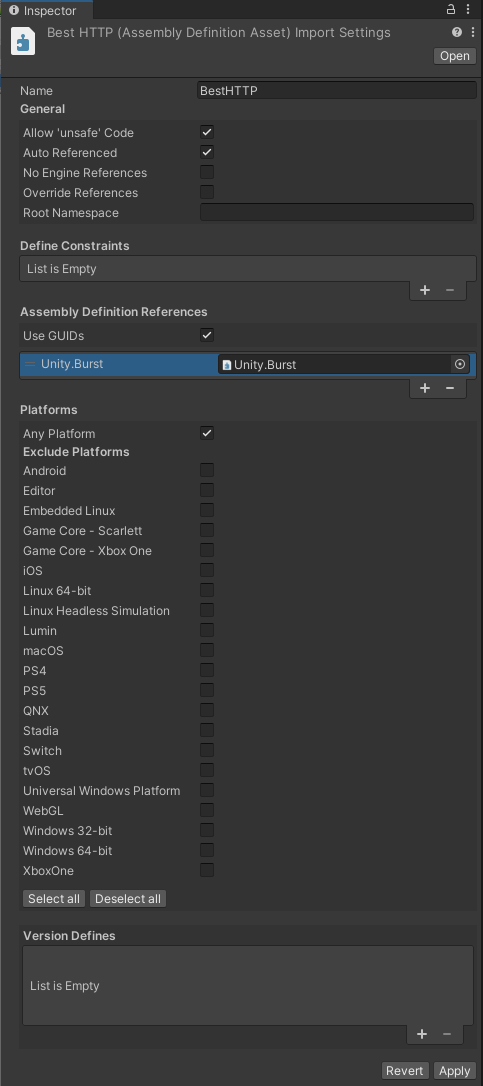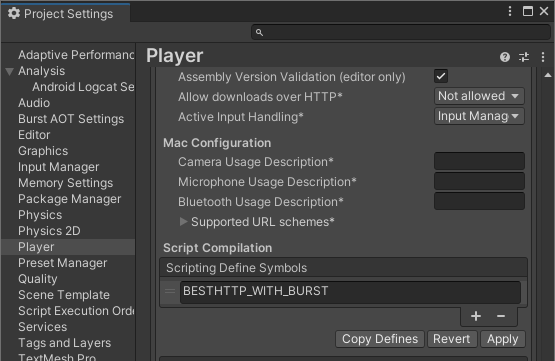HTTPS
To support modern TLS versions on as much platforms as the plugin just can, it comes bundled with Bouncy Castle. Bouncy Castle is the default TLS provider of the plugin and while it’s a good replacement in general, sometime it can fail too for newer algorithms. Because of this, its usage can be disabled and the default SslStream implementation will be used instead.
To disable the use of Bouncy Castle globally, the following line can be added somewhere in a startup code:
BestHTTP.HTTPManager.UseAlternateSSLDefaultValue = false;
ALPN featureServer Certication Verification
The plugin by default doesn’t do any certication verification, accepts all -including self signed- certificates. To add a global verifier the default TLS client implementation can used as a base class:
using BestHTTP.SecureProtocol.Org.BouncyCastle.Tls;
public sealed class CustomTlsClient : BestHTTP.Connections.TLS.DefaultTls13Client
{
public CustomTlsClient(Uri uri, List<ServerName> sniServerNames, List<ProtocolName> protocols) : base(uri, sniServerNames, protocols)
{
}
public override void NotifyServerCertificate(TlsServerCertificate serverCertificate)
{
// TODO: Verify the server sent certificate(s). Throw exceptions when invalid.
}
}
And must be used in a TLS client factory:
HTTPManager.TlsClientFactory = (HTTPRequest request, List<ProtocolName> protocols) =>
{
List<ServerName> hostNames = null;
// If there's no user defined one and the host isn't an IP address, add the default one
if (!request.CurrentUri.IsHostIsAnIPAddress())
{
hostNames = new List<ServerName>(1);
hostNames.Add(new ServerName(0, System.Text.Encoding.UTF8.GetBytes(request.CurrentUri.Host)));
}
return new CustomTlsClient(request.CurrentUri, hostNames, protocols);
};
This implementation is the same as the one that the plugin uses by default: accepts all certificates. I would recommend to use the TLS Security Addon for a full-fledged solution.
Client Certications
Similarly to the server certication verification, the GetClientCredentials function can be overridden in the custom tls client to load and return with the client’s certication:
public sealed class CustomTlsClient : BestHTTP.Connections.TLS.DefaultTls13Client
{
public CustomTlsClient(Uri uri, List<ServerName> sniServerNames, List<ProtocolName> protocols) : base(uri, sniServerNames, protocols)
{
}
public override TlsCredentials GetClientCredentials(CertificateRequest certificateRequest)
{
// TODO: find and return with a client certificate. base._uri contains the original uri the plugin trying to connect to.
return null;
}
}
To manage client certificates, i would recommend to use the TLS Security Addon for a full-fledged solution.
How to debug HTTPS requests
The plugin doesn’t verify server certificate so it’s easy to set up a proxy and route the intersting requests through it. Charles Proxy is one of the easiest proxy to set up and use.
The plugin also supports the NSS Key Log Format. In the editor when the SSLKEYLOGFILE environment variable is present, the plugin will write the client random of the SSL session to the file. 3rd party programs like Wireshark can use this file to decrypt packets sent by the plugin.
How to enable TLS 1.1
v2.6.0 upped the minimum supported TLS version to 1.2, but support for 1.1 still can be enabled the following way:
using BestHTTP;
using BestHTTP.Extensions;
using BestHTTP.SecureProtocol.Org.BouncyCastle.Tls;
// Place this line somewhere in your startup code to overwrite the default factory method
HTTPManager.TlsClientFactory = Tls11ClientFactory;
// TLS client factory implementation
static BestHTTP.Connections.TLS.AbstractTls13Client Tls11ClientFactory(HTTPRequest request, List<ProtocolName> protocols)
{
List<ServerName> hostNames = null;
if (!request.CurrentUri.IsHostIsAnIPAddress())
{
hostNames = new List<ServerName>(1);
hostNames.Add(new ServerName(0, System.Text.Encoding.UTF8.GetBytes(request.CurrentUri.Host)));
}
return new SupportForTLS11TlsClient(request, hostNames, protocols);
}
// Override the default tls client implemetation to add support for Tls v1.1
class SupportForTLS11TlsClient : BestHTTP.Connections.TLS.DefaultTls13Client
{
public SupportForTLS11TlsClient(HTTPRequest request, List<ServerName> sniServerNames, List<ProtocolName> protocols)
: base(request, sniServerNames, protocols)
{
}
protected override ProtocolVersion[] GetSupportedVersions() => ProtocolVersion.TLSv13.DownTo(ProtocolVersion.TLSv11);
}
Custom TLS Client
This is almost the same implementation than the previous topic, but the TLS client is implementing the AbstractTls13Client abstract class instead to gain slightly more control over configuration.
using BestHTTP;
using BestHTTP.Connections.TLS;
using BestHTTP.Extensions;
using BestHTTP.SecureProtocol.Org.BouncyCastle.Tls;
using BestHTTP.SecureProtocol.Org.BouncyCastle.Tls.Crypto.Impl.BC;
using BestHTTP.SecureProtocol.Org.BouncyCastle.Security;
// Place this line somewhere in your startup code to overwrite the default factory method
HTTPManager.TlsClientFactory = CustomTLSClientFactory;
// TLS client factory implementation
static AbstractTls13Client CustomTLSClientFactory(HTTPRequest request, List<ProtocolName> protocols)
{
List<ServerName> hostNames = null;
if (!request.CurrentUri.IsHostIsAnIPAddress())
{
hostNames = new List<ServerName>(1);
hostNames.Add(new ServerName(0, System.Text.Encoding.UTF8.GetBytes(request.CurrentUri.Host)));
}
return new CustomTLSClient(request, hostNames, protocols);
}
// TLS client implementation
class CustomTLSClient : AbstractTls13Client
{
public CustomTLSClient(HTTPRequest request, List<ServerName> sniServerNames, List<ProtocolName> protocols)
: base(request, sniServerNames, protocols, new BcTlsCrypto(new SecureRandom()))
{
}
}
Boost TLS encrypt/decrypt performance with Burst
Steps to speed up GCM block cipher and ChaCha20 engine (the two most used chiper suites in TLS 1.3) with Burst:
- Install Burst using Unity’s Package Manager. Minimum supported Burst version is v1.7.3.
- Locate and select the BestHTTP.asmdef in the
Assets\Best HTTP\folder. -
Add
Unity.Burstto the Assembly Definition References and press Apply:
-
Add the BESTHTTP_WITH_BURST symbol to the Scripting Define Symbols input under PlayerSettings/Other Settings and press Apply:
